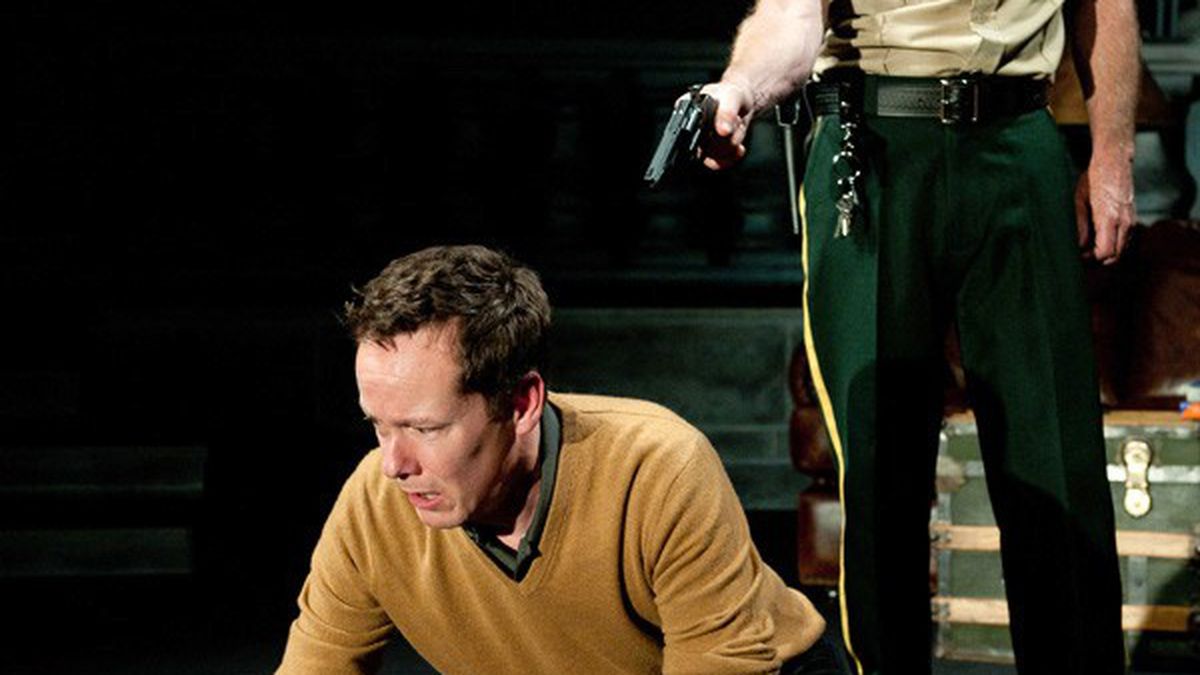Just how much of Ghost Light is true remains a matter of conjecture for those of us who don’t personally know Jonathan Moscone. Of course, the basic story is well known: Moscone is the son of George Richard Moscone, the former state Senate majority leader and mayor of San Francisco who was assassinated along with famed gay Supervisor Harvey Milk in 1978. The younger Moscone was fourteen years old at the time of his father’s death, and the event would plummet him into a three-decade emotional tailspin. That’s the meat of the play, which also offers some hypotheses as to why Jonathan never quite came to terms with his father’s death — like the fact that it was gradually overshadowed by the shooting of Milk, which became the subject of a 2008 biopic. Or Moscone coming to grips with his own homosexuality. Or the conceit (in Ghost Light, at least) that young Jonathan never knew his father that well, and thus felt a certain sense of inadequacy in trying to mourn the man.
If you accept that premise, then Ghost Light is both an autobiography and a long-deferred grieving ceremony. Not just for Moscone, either, given the number of local dignitaries who showed up for the press opening at Berkeley Rep — including former San Francisco Mayor Willie Brown and Berkeley Mayor Tom Bates, George Moscone’s widow Gina, and House Minority Leader Nancy Pelosi (who came with a Secret Service agent in tow). The set design (by Todd Rosenthal) features a detailed replica of the facade of City Hall meant to serve as a mausoleum. The plot, conceived by both Jonathan Moscone, who directed, and Berkeley Rep Artistic Director Tony Taccone, who wrote the script, conjoins two highly symbolic storylines. First: Jonathan (played by Christopher Liam Moore) is working on a production of Hamlet, the Shakespearian tragedy in which the ghost of a murdered father comes to visit his young son. At the same time, he’s been enlisted to consult on the set of Milk. You could venture so far as to say there’s a third element, too, which is about Moscone having to reconcile his private life as a gay man with his cult of celebrity.
The play might be a little more fun for those who peek at the 2012 calendar for California Shakespeare Theater — where Moscone serves as artistic director — and note that Hamlet is, indeed, playing this September, albeit under the auspice of Director Liesl Tommy, not Moscone himself. That said, it’s certainly possible that Moscone was, at one point, slated to help a production of Hamlet, and that it generated in him a welter of anxiety. The Moscone in this play is a little more frazzled and flamboyant than the real Moscone — or, at least, the public image he puts forth, which is one of extreme self-possession. From the perspective of one who sees him only at press conferences or Cal Shakes openings, it’s difficult to imagine the troubled, nervous director who stays up late Internet-chatting with someone named “Loverboy” in a room littered with take-out Chinese food boxes.
But maybe that’s how Moscone perceives himself. Or maybe it’s a hyperbolized self-portrait he’s made for the purpose of plot. Whatever the case, this character is a little campy but thoroughly likeable. It’s also worth mentioning that he’s at least as smart as the real Moscone, prone to witticisms like, “The most astonishing thing about you is that you are unburdened by thought,” (an insult aimed at the director of Milk). In fact, the dialogue is as sharp and fast as if Edward Albee or Aaron Sorkin wrote it. And it’s probably a fairly accurate scripting of the conversations that took place between Moscone and his colleague Louise (Robynn Rodriguez), who bears an uncanny resemblance to real-life managing director Susie Falk (at least in her sartorial choices). It’s a script that actually asks quite a lot of audience members, both because it’s littered with literary references and because it requires a certain understanding of Bay Area theater — the scenes that show Moscone teaching a seminar on Hamlet are a lot funnier if you know that he is, indeed, a sought-after teacher at the Berkeley Rep School of Theatre.
But leave it to Tony Taccone to place high expectations on his audience. He apparently based the show on extensive conversations with Jonathan Moscone, adopting a process somewhat similar to the one he used with Rita Moreno for Life Without Makeup. The whole idea was to tell the story of a major historical event — the one that brought terms like “Twinkie defense” into the pop lexicon — from a child’s point of view. The storyline gets smeary at points, and toward the end of Act II you really do start to feel like you’re watching Moscone process his grief — so perhaps that part could be truncated a bit. That said, it seems that many of us still haven’t quite come to terms with the assassination of George Moscone, judging from the tears shed visibly on press night, as Moore recited a Hamlet monologue that Jonathan committed to memory as a teenager: I am thy father’s spirit, Doom’d for a certain term to walk the night.














